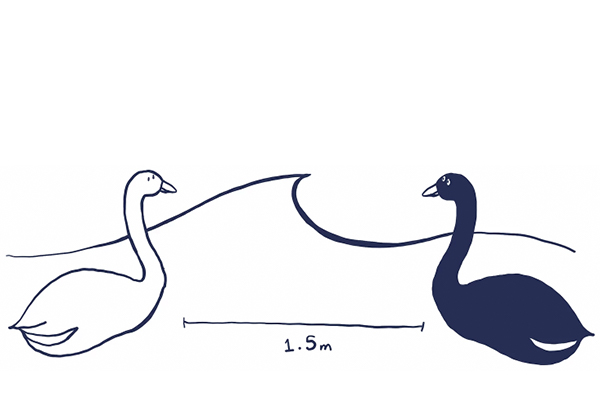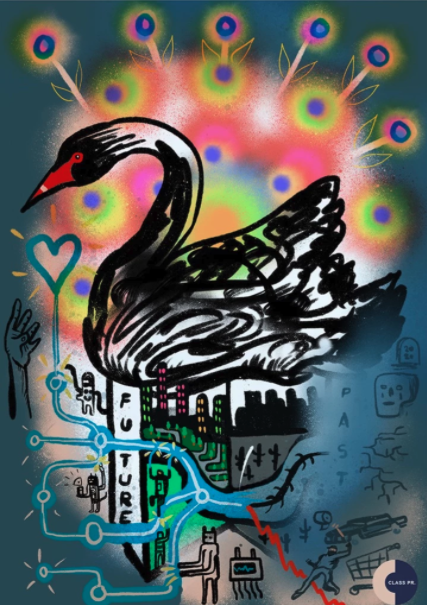
COVID-19: THE ‘Black Swan’ event of our time…
WE’RE HOPING THAT INNOVATION IS THE PANDEMIC’S WELCOME YET UNEXPECTED BY-PRODUCT.
The term “Black Swan” originates from Dutch explorer, Willem de Vlamingh’s shocking discovery of black swans in Australia in 1967. This discovery, disrupted zoology forever, derailing the widely held belief that only white swans existed.
Fast forward to 2007 and Nassim Taleb, academic, statistician and risk analyst applied the term ‘Black Swan’ to describe events with the following characteristics: “rarity, extreme impact, and retrospective though not prospective predictability.”
Black Swan Theory in a nutshell: Black Swan events are impossible to predict (outliers); have a huge impact; and cause mankind to try to rationalise/explain the occurrence after the fact.
Given most consequential world events are unexpected, statistics (which depends upon analysis of the past) is ill equipped to deal with or predict events that are “outside the model”, leaving us vulnerable and exposed.
The COVID-19 pandemic is a case in point for Taleb – society and its systems are ‘on hold’ until further notice and its biological, psychosocial and economic impact will be felt long after the immediate threat has dissipated. COVID-19 is like nothing we’ve ever experienced due to its biological, psychosocial and economic impact.
The question then begs: if we cannot predict Black Swan events, how can we prepare for them? All we can do is endeavour to make our way of life as ‘Black Swan-proof’ as possible. And how do we do that?

There is a longstanding correlation between Black Swan events and an uptake in innovation. The SARS Pandemic saw the emergence of Alibaba, Asia’s preeminent retail giant while the Global Financial Crisis resulted in the emergence of disruptive technology like Uber and Airbnb.
COV-ID 19 has already caused a seismic shift in the way we consume and will result in: augmentation of Digital Startups to overcome negative psychosocial and economic impacts of the pandemic; and an accelerated adoption rate for both corporations and end-users. Some examples include:
Adoption of new technology to improve resilience of Global Supply Chains
AI, 5G, robotics, IoT (the Internet of Things) and blockchain will help to create a more resilient supply chain. For an example of how AI can help to predict supply chain feasibility, look at BCG’s digital twins.
Emergence of Digital Bureaucracy
Smart Cities will emerge (a smart city is an urban area that uses the IoT to collect data in order to manage assets, resources and services effectively). Consider South Korea’s rapid “drive through” testing of over 250,000 citizens; and use of Smart Phones to track movements of the infected in real time.
Digital acquisition, onboarding, retention and customer management
As people’s movements are restricted, they will rely on digital rather than face-to-face customer service – Australian Banks are already running radio ads requesting customers use online banking or their app rather where possible. Other examples of new apps to overcome the effects of social-distancing include: mental health start-ups likeBraive, Moment & Pebble, as well as mentoring and development apps such as Ripple
FOCUS ON THE UPSIDE We’ll come out the other side: we’ve already made it through Seasonal Flu, Rotavirus, SARS, and Swine Flu. Use this period to consider how to make your life & business ‘Black Swan-proof’. Developing and embracing new technologies, processes and systems so that you come out of COVID-19 more resilient than ever.

COVID-19: THE ‘Black Swan’ event of our time…
WE’RE HOPING THAT INNOVATION IS THE PANDEMIC’S WELCOME YET UNEXPECTED BY-PRODUCT.
The term “Black Swan” originates from Dutch explorer, Willem de Vlamingh’s shocking discovery of black swans in Australia in 1967. This discovery, disrupted zoology forever, derailing the widely held belief that only white swans existed.
Fast forward to 2007 and Nassim Taleb, academic, statistician and risk analyst applied the term ‘Black Swan’ to describe events with the following characteristics: “rarity, extreme impact, and retrospective though not prospective predictability.”
Black Swan Theory in a nutshell: Black Swan events are impossible to predict (outliers); have a huge impact; and cause mankind to try to rationalise/explain the occurrence after the fact.
Given most consequential world events are unexpected, statistics (which depends upon analysis of the past) is ill equipped to deal with or predict events that are “outside the model”, leaving us vulnerable and exposed.
The COVID-19 pandemic is a case in point for Taleb – society and its systems are ‘on hold’ until further notice and its biological, psychosocial and economic impact will be felt long after the immediate threat has dissipated. COVID-19 is like nothing we’ve ever experienced due to its biological, psychosocial and economic impact.
The question then begs: if we cannot predict Black Swan events, how can we prepare for them? All we can do is endeavour to make our way of life as ‘Black Swan-proof’ as possible. And how do we do that?

There is a longstanding correlation between Black Swan events and an uptake in innovation. The SARS Pandemic saw the emergence of Alibaba, Asia’s preeminent retail giant while the Global Financial Crisis resulted in the emergence of disruptive technology like Uber and Airbnb.
COV-ID 19 has already caused a seismic shift in the way we consume and will result in: augmentation of Digital Startups to overcome negative psychosocial and economic impacts of the pandemic; and an accelerated adoption rate for both corporations and end-users. Some examples include:
Adoption of new technology to improve resilience of Global Supply Chains
AI, 5G, robotics, IoT (the Internet of Things) and blockchain will help to create a more resilient supply chain. For an example of how AI can help to predict supply chain feasibility, look at BCG’s digital twins.
Emergence of Digital Bureaucracy
Smart Cities will emerge (a smart city is an urban area that uses the IoT to collect data in order to manage assets, resources and services effectively). Consider South Korea’s rapid “drive through” testing of over 250,000 citizens; and use of Smart Phones to track movements of the infected in real time.
Digital acquisition, onboarding, retention and customer management
As people’s movements are restricted, they will rely on digital rather than face-to-face customer service – Australian Banks are already running radio ads requesting customers use online banking or their app rather where possible. Other examples of new apps to overcome the effects of social-distancing include: mental health start-ups likeBraive, Moment & Pebble, as well as mentoring and development apps such as Ripple
FOCUS ON THE UPSIDE We’ll come out the other side: we’ve already made it through Seasonal Flu, Rotavirus, SARS, and Swine Flu. Use this period to consider how to make your life & business ‘Black Swan-proof’. Developing and embracing new technologies, processes and systems so that you come out of COVID-19 more resilient than ever.

